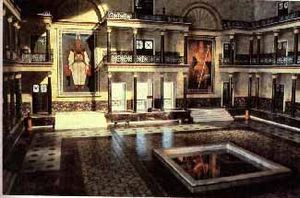Library Of Alexandria
 From Conservapedia
From Conservapedia The Library of Alexandria in Egypt was the largest library in the ancient world. It was founded at the beginning of the third century BC during the reign of Ptolemy II of Egypt. It supported the Musaeum, a temple to the Muses and a university-level center of research and learning. It was destroyed by fire at the time of Julius Caesar's visit to Alexandria in 48 BC.
The library was conceived largely as an attempt to bring together in Alexandria the whole of the earlier Greek science, art, and literature. At one point the library held close to 500,000 volumes.
Plutarch describes how the library burned down in 48 BC when Caesar set fire to his own ships in the harbor of Alexandria:
when the enemy endeavored to cut off his communication by sea, he was forced to divert that danger by setting fire to his own ships, which, after burning the docks, thence spread on and destroyed the great library.[1]
This account was written around AD 100. As Plutarch visited Alexandria, he would have noticed if the institution still existed in his time. Strabo visited Alexandria in 20 BC and wrote a detailed description of the palace and the Musaeum, but he does not mention the library.[2] This suggests that the library no longer existed at the time of Strabo's visit, at least not as a separate building.
Plutarch transcribes a speech by a supporter of Augustus which includes this accusation against Anthony: "He had bestowed upon [Cleopatra] the libraries from Pergamum, in which there were 200,000 volumes." English historian Edward Gibbon suggests that Cleopatra rebuilt the library using these volumes as the basis of a new collection.[3] But the tone of the speech is propagandistic, there is no suggestion that Plutarch concurs with any of the accusations it makes, and it does not say what library the Pergamum books were taken to.
Alexandria again become a center of learning under the Romans. It had several major libraries, including the Seraphim. The Musaeum was burned down by Aurelian in 272, along with whatever library holdings it contained. In the fourth century, the books in Alexandria's libraries were removed. (They may have been taken to Constantinople). As a pagan temple, the Seraphim was leveled by Bishop Theophilus in AD 391. Based on this incident, Gibbon accused Christians of destroying the library.[4]
The loss of the library, which contained the original (and sometimes only) copies of most of the ancient world's greatest works of literature, resulted in the decimation of ancient literature, and accounts for the modern paucity of ancient materials. Scholars estimate that historians now have only 1/10th of 1 percent of the ancient world's original source material to rely upon, as an almost exclusive result of the library's destruction. As an example, among the material lost in the library was a first-hand account of the life of Alexander the Great, written by his general and boyhood friend, Ptolemy. Historians know of the book's existence by a citation to it in a secondary source.
References[edit]
- ↑ Plutarch, Life of Caesar, 49.6.
- ↑ The Mysterious Fate of the Great Library of Alexandria", Bede's Library
- ↑ Gibbon, Edward, The Decline and Fall of the Roman Empire, Chapter 28, Note 041, "The old library of the Ptolemies was totally consumed in Caesar's Alexandrian war. Marc Antony gave the whole collection of Pergamus (200,000 volumes) to Cleopatra, as the foundation of the new library of Alexandria."
- ↑ Gibbon, Edward, The Decline and Fall of the Roman Empire, Chapter 28, "The valuable library of Alexandria was pillaged or destroyed; and near twenty years afterwards, the appearance of the empty shelves excited the regret and indignation of every spectator whose mind was not totally darkened by religious prejudice."
See also[edit]
External links[edit]
Categories: [Egypt] [Ancient Greece] [Wonders of the World] [Libraries]
↧ Download as ZWI file | Last modified: 03/12/2023 03:59:43 | 28 views
☰ Source: https://www.conservapedia.com/Library_of_Alexandria | License: CC BY-SA 3.0
 ZWI signed:
ZWI signed:
 KSF
KSF